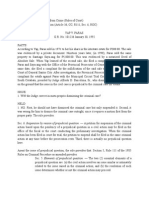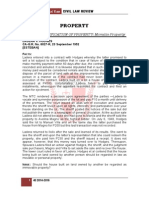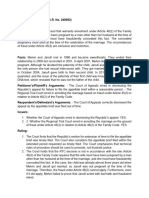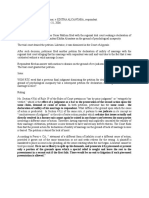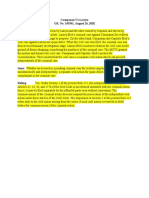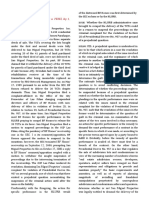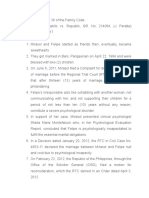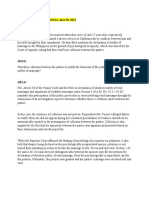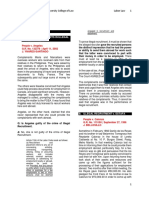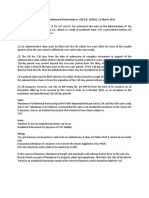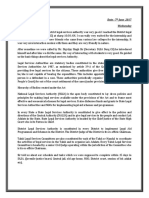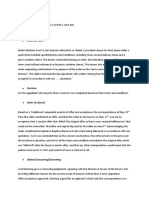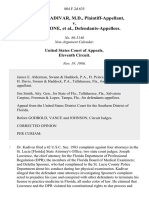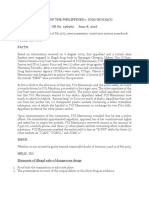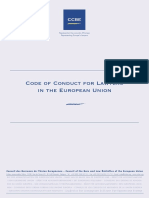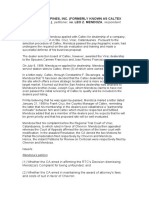0 ratings0% found this document useful (0 votes)
288 viewsMontanez v. Cipriano, G.R. No. 181089, October 22, 2012
Montanez v. Cipriano, G.R. No. 181089, October 22, 2012
Uploaded by
Gela Bea BarriosMontanez v. Cipriano involved a case where the respondent was charged with bigamy. The respondent was first married in 1976 and then married Silverio Cipriano in 1983 while still married to her first husband. In 2001, the respondent filed for annulment of her first marriage, which was declared null in 2003. In 2004, the daughter of Silverio Cipriano filed a complaint against the respondent for bigamy. The RTC dismissed the case, finding that both marriages were under the Civil Code. The Supreme Court held that the declaration of nullity of the first marriage in 2003 did not justify dismissal of the bigamy charge, as the crime of bigamy was already committed when she married
Copyright:
© All Rights Reserved
Available Formats
Download as DOCX, PDF, TXT or read online from Scribd
Montanez v. Cipriano, G.R. No. 181089, October 22, 2012
Montanez v. Cipriano, G.R. No. 181089, October 22, 2012
Uploaded by
Gela Bea Barrios0 ratings0% found this document useful (0 votes)
288 views1 pageMontanez v. Cipriano involved a case where the respondent was charged with bigamy. The respondent was first married in 1976 and then married Silverio Cipriano in 1983 while still married to her first husband. In 2001, the respondent filed for annulment of her first marriage, which was declared null in 2003. In 2004, the daughter of Silverio Cipriano filed a complaint against the respondent for bigamy. The RTC dismissed the case, finding that both marriages were under the Civil Code. The Supreme Court held that the declaration of nullity of the first marriage in 2003 did not justify dismissal of the bigamy charge, as the crime of bigamy was already committed when she married
Original Description:
Montanez v. Cipriano, G.R. No. 181089, October 22, 2012
Copyright
© © All Rights Reserved
Available Formats
DOCX, PDF, TXT or read online from Scribd
Share this document
Did you find this document useful?
Is this content inappropriate?
Montanez v. Cipriano involved a case where the respondent was charged with bigamy. The respondent was first married in 1976 and then married Silverio Cipriano in 1983 while still married to her first husband. In 2001, the respondent filed for annulment of her first marriage, which was declared null in 2003. In 2004, the daughter of Silverio Cipriano filed a complaint against the respondent for bigamy. The RTC dismissed the case, finding that both marriages were under the Civil Code. The Supreme Court held that the declaration of nullity of the first marriage in 2003 did not justify dismissal of the bigamy charge, as the crime of bigamy was already committed when she married
Copyright:
© All Rights Reserved
Available Formats
Download as DOCX, PDF, TXT or read online from Scribd
Download as docx, pdf, or txt
0 ratings0% found this document useful (0 votes)
288 views1 pageMontanez v. Cipriano, G.R. No. 181089, October 22, 2012
Montanez v. Cipriano, G.R. No. 181089, October 22, 2012
Uploaded by
Gela Bea BarriosMontanez v. Cipriano involved a case where the respondent was charged with bigamy. The respondent was first married in 1976 and then married Silverio Cipriano in 1983 while still married to her first husband. In 2001, the respondent filed for annulment of her first marriage, which was declared null in 2003. In 2004, the daughter of Silverio Cipriano filed a complaint against the respondent for bigamy. The RTC dismissed the case, finding that both marriages were under the Civil Code. The Supreme Court held that the declaration of nullity of the first marriage in 2003 did not justify dismissal of the bigamy charge, as the crime of bigamy was already committed when she married
Copyright:
© All Rights Reserved
Available Formats
Download as DOCX, PDF, TXT or read online from Scribd
Download as docx, pdf, or txt
You are on page 1of 1
Montanez v. Cipriano, G.R. No.
181089, October 22, 2012
FACTS: On April 8, 1976, respondent married Socrates Flores. On January
24, 1983, during the subsistence of the said marriage, respondent married
Silverio V. Cipriano. In 2001, respondent filed with the RTC of Muntinlupa a
Petition for the Annulment of her marriage with Socrates on the ground of
the latter’s psychological incapacity as defined under Article 36 of the Family
Code. On July 18, 2003, the RTC of Muntinlupa, declared the marriage of
respondent with Socrates null and void. Said decision became final and
executory on October 13, 2003. On May 14, 2004, petitioner Merlinda
Cipriano Montañez, Silverio’s daughter from the first marriage, filed with the
MTC of San Pedro, Laguna, a Complaint for Bigamy against respondent.
Lourdes Cipriano alleged that her first marriage was already declared void
ab initio in 2003. Thus, there was no more marriage to speak of prior to her
marriage to Silverio on January 24, 1983. The prosecution argued that the
crime of bigamy had already been consummated when respondent filed her
petition for declaration of nullity. RTC ruled in favor of respondent on the
ground that both wedding were governed by the Civil Code, and not the
Family Code, hence, no judicial declaration of absolute nullity as a condition
precedent to contracting a subsequent marriage.
ISSUE: Whether the declaration of nullity of respondent's first marriage in
2003 justifies the dismissal of the Information for bigamy filed against her.
HELD: NO. The retroactive application of procedural laws is not violative of
any right of a person who may feel that he is adversely affected. The reason
is that as a general rule, no vested right may attach to, nor arise from,
procedural laws. In the case at bar, the respondent’s clear intent was to
obtain judicial declaration of nullity to escape from the bigamy charges
against her.
You might also like
- EthicsDocument4 pagesEthicsbomama01No ratings yet
- Buenaventura vs. CA (G.R. No 127358, March 31, 2005)Document1 pageBuenaventura vs. CA (G.R. No 127358, March 31, 2005)Faye Christine May AmacnaNo ratings yet
- 7.c.2 Yap v. ParasDocument2 pages7.c.2 Yap v. ParasXandra Yzabelle T. EbdalinNo ratings yet
- Kho Vs RepublicDocument1 pageKho Vs RepublicJohn Fredrick BucuNo ratings yet
- Toshiba Information Equipment (Phils.) Inc. v. CIR, G.R. No. 157594, 09 March 2010Document1 pageToshiba Information Equipment (Phils.) Inc. v. CIR, G.R. No. 157594, 09 March 2010Gela Bea BarriosNo ratings yet
- Sample Deed of Absolute Sale of SharesDocument3 pagesSample Deed of Absolute Sale of SharesGela Bea BarriosNo ratings yet
- Capitol Medical Center vs. Meris (470 Scra 125, September 16, 2005)Document1 pageCapitol Medical Center vs. Meris (470 Scra 125, September 16, 2005)Gela Bea BarriosNo ratings yet
- Tad y Vs PeopleDocument1 pageTad y Vs PeopleDanny CastilloNo ratings yet
- Property - Case DigestsDocument83 pagesProperty - Case DigestsKimberly Arriola100% (3)
- Closed MemoDocument7 pagesClosed MemoYooHwa SeongNo ratings yet
- Montanez V Cipriano - ARCELLANADocument1 pageMontanez V Cipriano - ARCELLANAPatrick Violago ArcellanaNo ratings yet
- DIÑO vs. DIÑODocument2 pagesDIÑO vs. DIÑOAllen SoNo ratings yet
- Case Digets: Capili v. People, GR No. 183805, July 03, 2013Document2 pagesCase Digets: Capili v. People, GR No. 183805, July 03, 2013Lyka Angelique CisnerosNo ratings yet
- Diaz Salgado Vs Anson GR No. 204494 July 27 2016Document1 pageDiaz Salgado Vs Anson GR No. 204494 July 27 2016Vincent PanganNo ratings yet
- Buenaventura V CA DigestDocument1 pageBuenaventura V CA Digestmybernal18No ratings yet
- Castillo V Castillo G.R. No. 189607, April 18, 2016Document2 pagesCastillo V Castillo G.R. No. 189607, April 18, 2016Kim ValentinoNo ratings yet
- Siayngco vs. SiayngcoDocument2 pagesSiayngco vs. SiayngcojokuanNo ratings yet
- Kho v. Republic G.R. No. 187462. June 1, 2016Document2 pagesKho v. Republic G.R. No. 187462. June 1, 2016Tootsie Guzma100% (2)
- Navarro V DomagtoyDocument1 pageNavarro V DomagtoyG S0% (1)
- Martinez Vs - Van BuskirkDocument2 pagesMartinez Vs - Van BuskirkEumell Alexis PaleNo ratings yet
- Limjoco V Intestate Estate of Fragrante G.R. No. L-770, April 27, 1948Document2 pagesLimjoco V Intestate Estate of Fragrante G.R. No. L-770, April 27, 1948Marivic Veneracion100% (1)
- G.R. NO. 155409 DigestDocument1 pageG.R. NO. 155409 DigestPhilip Cesar EstreraNo ratings yet
- Republic v. Villacorta (G.R. No. 249953)Document1 pageRepublic v. Villacorta (G.R. No. 249953)prince pacasumNo ratings yet
- MALLION v. ALCANTARADocument1 pageMALLION v. ALCANTARARywNo ratings yet
- Bier Vs BierDocument1 pageBier Vs BierwesleybooksNo ratings yet
- Mallion v. Alcantara Case DigestDocument1 pageMallion v. Alcantara Case DigestCharmila Siplon100% (1)
- Republic vs. Quiñonez, G.R. # 237412, Jan. 6, 2020Document3 pagesRepublic vs. Quiñonez, G.R. # 237412, Jan. 6, 2020Kael Marmalade100% (1)
- Tuason Vs CADocument2 pagesTuason Vs CARo CheNo ratings yet
- Republic vs. AlbiosDocument2 pagesRepublic vs. AlbiosJam GonzagaNo ratings yet
- Casupanan Vs LaroyaDocument2 pagesCasupanan Vs LaroyaCaroline A. Legaspino100% (1)
- Matudan V RepublicDocument1 pageMatudan V Republicana ortiz0% (1)
- Maquilan v. MaquilanDocument2 pagesMaquilan v. MaquilanRywNo ratings yet
- GR 109975 Rep of The Phils Vs Dagdag No Due ProcessDocument1 pageGR 109975 Rep of The Phils Vs Dagdag No Due ProcessMichael JonesNo ratings yet
- Globe Mackay Cable Vs CADocument1 pageGlobe Mackay Cable Vs CARyw100% (1)
- G.R. No. 187462, June 01, 2016Document2 pagesG.R. No. 187462, June 01, 2016Zeresh100% (1)
- San Miguel Properties Inc. Vs Perez, Sep 4,: IssueDocument2 pagesSan Miguel Properties Inc. Vs Perez, Sep 4,: IssueJesa FormaranNo ratings yet
- Spouses Fuentes Vs RocaDocument3 pagesSpouses Fuentes Vs Rocaphgmb100% (2)
- Gashem Shookat Baksh v. Court of Appeals, 219 SCRA 115Document2 pagesGashem Shookat Baksh v. Court of Appeals, 219 SCRA 115Jazzy AlimNo ratings yet
- My Recit (San Miguel vs. Perez)Document2 pagesMy Recit (San Miguel vs. Perez)Gilbert Yap100% (1)
- Madeja vs. CaroDocument1 pageMadeja vs. CaroVanya Klarika Nuque100% (3)
- People vs. LiceraDocument2 pagesPeople vs. Licerajey100% (1)
- JESUS C. GARCIA, Petitioner, Vs - THE HONORABLE RAY ALAN T. DRILON, Presiding Judge, RegionalDocument2 pagesJESUS C. GARCIA, Petitioner, Vs - THE HONORABLE RAY ALAN T. DRILON, Presiding Judge, RegionalChristina AureNo ratings yet
- Tenebro vs. CA DigestDocument1 pageTenebro vs. CA DigestJanlo Fevidal100% (2)
- Josefina V. Nobleza, Petitioner, vs. Shirley B. NUEGA, RespondentDocument4 pagesJosefina V. Nobleza, Petitioner, vs. Shirley B. NUEGA, RespondentTrisNo ratings yet
- 79.1 Enrico vs. Heirs of Sps. Medinaceli DigestDocument2 pages79.1 Enrico vs. Heirs of Sps. Medinaceli DigestEstel Tabumfama100% (2)
- 20 Castillo vs. Republic, GR. No. 214064, Feb. 6, 2017Document2 pages20 Castillo vs. Republic, GR. No. 214064, Feb. 6, 2017Gloria, Melica Ina V.No ratings yet
- Carpio Vs ValmonteDocument2 pagesCarpio Vs ValmonteCarlota Nicolas VillaromanNo ratings yet
- Marbella-Bobis Vs Bobis - GR No. 138509Document2 pagesMarbella-Bobis Vs Bobis - GR No. 138509Nikay Serdeña100% (1)
- Agustin Vs CADocument2 pagesAgustin Vs CAjovifactorNo ratings yet
- Wassmer v. Velez, GR. No. L-20089, December 26, 1964Document1 pageWassmer v. Velez, GR. No. L-20089, December 26, 1964MonicaCelineCaro100% (1)
- Castillo v. Castillo DIGESTDocument2 pagesCastillo v. Castillo DIGESTApril100% (1)
- Toda JR Vs CADocument2 pagesToda JR Vs CAJoshua OuanoNo ratings yet
- Yu V Carpio DigestDocument1 pageYu V Carpio DigestLayaNo ratings yet
- Martinez v. MartinezDocument2 pagesMartinez v. MartinezDianne Bernadeth Cos-agonNo ratings yet
- Carino V CarinoDocument1 pageCarino V CarinoG SNo ratings yet
- Eulogio v. Bell, SRDocument1 pageEulogio v. Bell, SRAKNo ratings yet
- PNB Vs Reyes JRDocument2 pagesPNB Vs Reyes JRElvis Jagger Abdul JabharNo ratings yet
- Martinez v. Buskirk (Digest)Document2 pagesMartinez v. Buskirk (Digest)Kim B.100% (1)
- Capili V. People G.R. No. 183805 July 3, 2013 FactsDocument7 pagesCapili V. People G.R. No. 183805 July 3, 2013 FactsMirellaNo ratings yet
- Malaki v. PeopleDocument2 pagesMalaki v. PeopleKlyza Zyra KateNo ratings yet
- Martinez v. Tan, GR. No. 4904, February 5, 1909Document1 pageMartinez v. Tan, GR. No. 4904, February 5, 1909MonicaCelineCaroNo ratings yet
- (B42) LAW 104 - Cruz v. CA (G.R. NO. 12245)Document2 pages(B42) LAW 104 - Cruz v. CA (G.R. NO. 12245)mNo ratings yet
- Puyat - Siochi PFR CaseDocument9 pagesPuyat - Siochi PFR CaseKatrina PerezNo ratings yet
- Abigael An Espina-Dan Vs Marco Dan, G.R. No. 209031, April 16, 2018Document3 pagesAbigael An Espina-Dan Vs Marco Dan, G.R. No. 209031, April 16, 2018Inday Liberty100% (1)
- Chu Jan vs. Bernas (G.R. No. L-10010)Document1 pageChu Jan vs. Bernas (G.R. No. L-10010)Evangelyn Egusquiza100% (4)
- Montanez v. Cipriano, G.R. No. 181089, October 22, 2012Document1 pageMontanez v. Cipriano, G.R. No. 181089, October 22, 2012RR FNo ratings yet
- Montanez v. CiprianoDocument2 pagesMontanez v. CiprianoGigi LucilleNo ratings yet
- Police ReportDocument2 pagesPolice ReportGela Bea BarriosNo ratings yet
- (G.r. No. 150155. September 1, 2004) Spouses Ramon and Felicisima Dioso, Petitioners, vs. Spouses Tomas and Leonora Cardeo, Respondents.Document6 pages(G.r. No. 150155. September 1, 2004) Spouses Ramon and Felicisima Dioso, Petitioners, vs. Spouses Tomas and Leonora Cardeo, Respondents.Gela Bea BarriosNo ratings yet
- Credits For Input Tax 110ADocument1 pageCredits For Input Tax 110AGela Bea BarriosNo ratings yet
- Republic of The Philippines/SSC/SSS vs. Asiapro Cooperative FactsDocument2 pagesRepublic of The Philippines/SSC/SSS vs. Asiapro Cooperative FactsGela Bea BarriosNo ratings yet
- Labor Case DigestsDocument18 pagesLabor Case DigestsGela Bea BarriosNo ratings yet
- Determination of The Prescriptive Period For Filing A Tax Refund or Credit of Unutilized Input VATDocument1 pageDetermination of The Prescriptive Period For Filing A Tax Refund or Credit of Unutilized Input VATGela Bea BarriosNo ratings yet
- G.R. No. 207112, December 08, 2015 Pilipinas Total Gas, Inc., Petitioner, V. Commissioner of Internal Revenue, Respondent.Document11 pagesG.R. No. 207112, December 08, 2015 Pilipinas Total Gas, Inc., Petitioner, V. Commissioner of Internal Revenue, Respondent.Gela Bea BarriosNo ratings yet
- Mindanao II Geothermal Partnership vs. CIR G.R. 193301, 11 March 2013Document1 pageMindanao II Geothermal Partnership vs. CIR G.R. 193301, 11 March 2013Gela Bea Barrios100% (1)
- Hilton v. GuyotDocument2 pagesHilton v. GuyotGela Bea BarriosNo ratings yet
- San Miguel Brewery Sales Force Union (PTGWO) vs. Hon. Blas Ople G.R. No. L-53515, February 8, 1989Document1 pageSan Miguel Brewery Sales Force Union (PTGWO) vs. Hon. Blas Ople G.R. No. L-53515, February 8, 1989Gela Bea BarriosNo ratings yet
- Widows and Orphans Vs CADocument1 pageWidows and Orphans Vs CAGela Bea BarriosNo ratings yet
- Ong Ching Po VS CaDocument1 pageOng Ching Po VS CaGela Bea BarriosNo ratings yet
- Sec. 4. Judicial Admissions.Document1 pageSec. 4. Judicial Admissions.Gela Bea BarriosNo ratings yet
- G.R. No. 130730 October 19, 2001: Gener vs. de LeonDocument1 pageG.R. No. 130730 October 19, 2001: Gener vs. de LeonGela Bea BarriosNo ratings yet
- Zalamea vs. Court of Appeals 288 SCRA 23 (1993)Document2 pagesZalamea vs. Court of Appeals 288 SCRA 23 (1993)Gela Bea BarriosNo ratings yet
- LABOR DigestsDocument8 pagesLABOR DigestsGela Bea BarriosNo ratings yet
- To Be Considered A Judicial AdmissionDocument1 pageTo Be Considered A Judicial AdmissionGela Bea BarriosNo ratings yet
- Petitioner Does Not Ipso Facto Negate The Application of DNA Testing For As Long As There Exist Appropriate Biological Samples of His DNADocument1 pagePetitioner Does Not Ipso Facto Negate The Application of DNA Testing For As Long As There Exist Appropriate Biological Samples of His DNAGela Bea BarriosNo ratings yet
- Ma. Finina E. Vicente Petitioner v. CA, Former Seventeenth Division and Cinderella Marketing Corporation, Respondents.Document2 pagesMa. Finina E. Vicente Petitioner v. CA, Former Seventeenth Division and Cinderella Marketing Corporation, Respondents.Gela Bea BarriosNo ratings yet
- Cir V B.F. Goodrich Phil., Inc., Et Al GR No. 104171, February 24, 1999Document1 pageCir V B.F. Goodrich Phil., Inc., Et Al GR No. 104171, February 24, 1999Gela Bea BarriosNo ratings yet
- Evid CasesDocument34 pagesEvid CasesGela Bea BarriosNo ratings yet
- CIR vs. Gonzales (G.R. No. L-19495, November 24, 1966, 18 SCRA 757.) SyllabusDocument2 pagesCIR vs. Gonzales (G.R. No. L-19495, November 24, 1966, 18 SCRA 757.) SyllabusGela Bea BarriosNo ratings yet
- DLSA (Report) 1Document6 pagesDLSA (Report) 1Anonymous KRQaT2PnYqNo ratings yet
- Soliven v. FastformsDocument3 pagesSoliven v. FastformsTippy Dos SantosNo ratings yet
- Case Note Butler Machine 201718Document4 pagesCase Note Butler Machine 201718Maggie SalisburyNo ratings yet
- 27 LWV Construction v. DupoDocument5 pages27 LWV Construction v. DupoMarianne Hope VillasNo ratings yet
- Sps Sta. Maria vs. CA - GrantedDocument5 pagesSps Sta. Maria vs. CA - Grantedalwayskeepthefaith8No ratings yet
- Hooshang Kadivar, M.D. v. Robert Stone, 804 F.2d 635, 11th Cir. (1986)Document3 pagesHooshang Kadivar, M.D. v. Robert Stone, 804 F.2d 635, 11th Cir. (1986)Scribd Government DocsNo ratings yet
- Republic of The Philippines v. Namboku Peak (Brian)Document2 pagesRepublic of The Philippines v. Namboku Peak (Brian)Carlo Pajo100% (1)
- Constitutional Basis of RA 9163 National Service Training Program Provisions Under 1987 Constitution Which Serves As Bases of NSTPDocument2 pagesConstitutional Basis of RA 9163 National Service Training Program Provisions Under 1987 Constitution Which Serves As Bases of NSTPEYENNo ratings yet
- Intestate Estate of Gonzales Vda. de Carungcong V PeopleDocument23 pagesIntestate Estate of Gonzales Vda. de Carungcong V PeopleFrances Ann TevesNo ratings yet
- People of The Philippines V SonjacoDocument2 pagesPeople of The Philippines V SonjacoBruce WayneNo ratings yet
- Complaint For Accion PublicianaDocument2 pagesComplaint For Accion PublicianaFaith Imee RobleNo ratings yet
- Altarejos Vs COMELECDocument2 pagesAltarejos Vs COMELECKariz EscañoNo ratings yet
- Article Iii Bill of Rights: Section 4Document4 pagesArticle Iii Bill of Rights: Section 4Khrislyne Jamae BanataoNo ratings yet
- Code of Conduct For Lawyers in The European Union: Représentant Les Avocats D'europe Representing Europe's LawyersDocument16 pagesCode of Conduct For Lawyers in The European Union: Représentant Les Avocats D'europe Representing Europe's LawyersAbdullah StoraiNo ratings yet
- Congress Passes & Obama Signed Anti-Occupy Law Making It A Felony!! March 2012Document5 pagesCongress Passes & Obama Signed Anti-Occupy Law Making It A Felony!! March 201283jjmackNo ratings yet
- REPUBLIC v. ANTONIO PRIETODocument12 pagesREPUBLIC v. ANTONIO PRIETORobert Jayson UyNo ratings yet
- Ambil JR V ComelecDocument4 pagesAmbil JR V ComelecDominic EstremosNo ratings yet
- Board of Law Examiners v. West Publishing Corporation Et Al - Document No. 3Document2 pagesBoard of Law Examiners v. West Publishing Corporation Et Al - Document No. 3Justia.comNo ratings yet
- WaqfDocument9 pagesWaqfHeerlina PariuryNo ratings yet
- Succession Midterms Reviewer (New)Document108 pagesSuccession Midterms Reviewer (New)melaniem_1100% (3)
- Committee Report 1152 MOA MagnoliaDocument6 pagesCommittee Report 1152 MOA MagnoliabubblingbrookNo ratings yet
- 1 Republic Vs Sandiganbayan Digest PDFDocument3 pages1 Republic Vs Sandiganbayan Digest PDFEmelie Marie DiezNo ratings yet
- Benchmark Review W QuestionsDocument43 pagesBenchmark Review W Questionsapi-328061525No ratings yet
- PartitionDocument5 pagesPartitionIsay Yason100% (2)
- Abbott V AlcarazDocument6 pagesAbbott V AlcarazErika Angela GalceranNo ratings yet
- Chevron Philippines, Inc. (Formerly Known As Caltex PHILIPPINES, INC.), Petitioner, vs. LEO Z. MENDOZA, RespondentDocument3 pagesChevron Philippines, Inc. (Formerly Known As Caltex PHILIPPINES, INC.), Petitioner, vs. LEO Z. MENDOZA, RespondentJosh NapizaNo ratings yet


